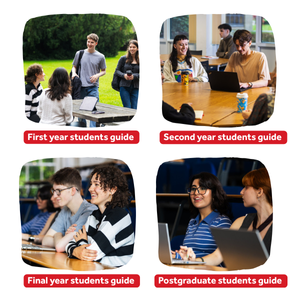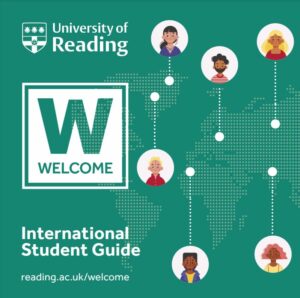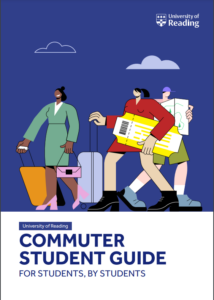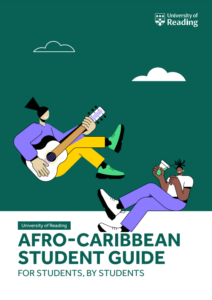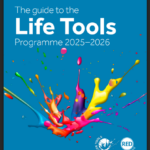Click on each heading to expand
Year-by-year guides: Helpful guides for every stage of study
Our year-by-year guides highlight support, opportunities and resources for every stage of the student journey to help students transition into university life, and the next stages of their course.
Within these guides students can easily find study and wellbeing support, as well as opportunities to connect with others, gain careers experience and prepare for their next steps:
First year students guide
Second year students guide
Final year students guide
Postgraduate students guide
Student Guides – by students for students
International Student Guide
This guide is aimed at new international students, and contains useful information about moving to the UK and settling in in Reading and at the university.
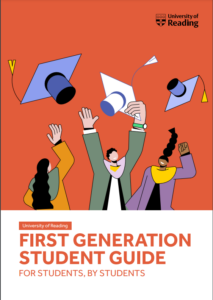
First generation student guide
This guide is intended to help students who are the first in their family to go to university transition to the University of Reading and navigate student life. It is written by current “first-generation” students who have drawn on their own experiences to offer tips and advice.
Commuter student guide
This guide is intended to help students who commute to university and navigate student life. It is written by current “commuter students” who have drawn on their own experiences to offer tips and advice.
Mature Student guide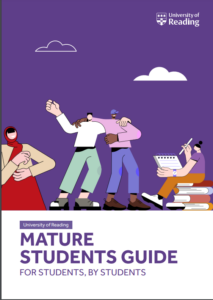
This guide is intended to help mature students transition back into academic life, whether they are returning after a career break, advancing their qualifications, or starting a new journey. It is written by current mature students who have drawn on their own experiences to provide tips and advice for navigating the unique challenges of returning to study.
Afro-Caribbean student guide
This guide is designed to support Black students in navigating university life and settling in comfortably. It has been co-produced by a group of current students, who have shared insights and tips based on their own experiences to help others on their journey.
Transitions guide from Student Minds
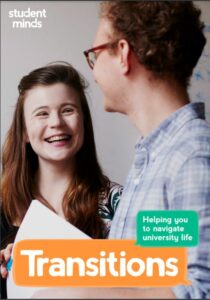
Student Minds is the UK’s student mental health charity. They have produced this guide to help students navigate the transition to university. There are sections on academic transition, money, health, relationships, identity etc. It also includes tips and strategies for helping students through challenging times and recommendations of where to go to get additional help, if needed.
Academic English Programme
The Academic English Programme 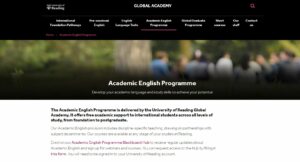 helps students whose first language is not English to reach their full potential on their Reading degree programmes. Each department at Reading has a dedicated Academic Language and Literacy Liaison contact. We can offer advice and support on matters related to international/EU students and any student whose first language is not English. For more information about the Academic English Programme, please look on the web pages.
helps students whose first language is not English to reach their full potential on their Reading degree programmes. Each department at Reading has a dedicated Academic Language and Literacy Liaison contact. We can offer advice and support on matters related to international/EU students and any student whose first language is not English. For more information about the Academic English Programme, please look on the web pages.
Developing academic skills
Study Advice has a range of Guides and Videos to support students of all levels to develop their academic skills, such as academic writing, referencing and time management. We also offer a weekly webinar and workshop programme, every Wednesday afternoon, which covers these skills in more depth. Students that require individual support to develop their skills can book a 1-2-1 advice session with a Study Adviser.
For those students with maths as part of their course, our maths resources support them with the mathematical concepts they need for their studies – such as algebra, differentiation, percentages and statistics.
All students have a dedicated subject Academic Liaison Librarian who can help them to make use of the wide range of resources available to them. Students can be directed to explore key resources in their subject or book a 1–2-1 with their Academic Liaison Librarian.
Study Smart
Study Smart is our online course for all new part 1 and foundation students, developed to support them with the transition to university. A link to the course (Study Smart 2025 link) is emailed to all new students at the end of August, and they are encouraged to take this 9 hours course before they arrive. It aims to give students the best possible preparation for university by focusing on academic integrity, communicating at university and independent learning. The course is interactive with videos, articles and discussion boards which are moderated by current students. Once enrolled students will retain access to all the resources, for their entire time with us. More information, including the structure of the course, can be found in our Tutor Guide
Feedback shows Study Smart is most successful when there is strong staff endorsement. The following are suggested actions you could take to increase the uptake of Study Smart for your School (courtesy of James Lloyd, whose course has consistently the highest uptake within the University):
- Mention Study Smart in all early communication, including Welcome talks, Facebook pages and on your applicant portal (making your expectations for completion clear – see example email in applicant portal)
- Add the Study Smart link into all communications, including HoD letter, so students can directly access the course rather than searching for their email.
- Set an early deadline as to when you want students to complete the course (e.g. Week 2). There is a certificate at the end of the course which they can print/upload to evidence this.
- Set up a Blackboard Organisation where students can upload their Study Smart certificates. Use this to check who hasn’t enrolled and to send reminders.
For further information about developing academic skills or Study Smart, please contact Dr Sonia Hood (Study Advice Manager).
Life Tools programme
The Life Tools programme is a psycho-educational training programme, and it is part of the Student Wellbeing Services’ proactive strategy to support students transition to university and during their academic studies. It has been designed specially to support students’ ongoing personal, academic, and professional development. Students can access the Life Tools blog, covering topics related to the talks/webinars. For a list of the topics covered in the programme, see the link on the Life Tools page on Essentials, or click on the brochure to the right.
This year we will continue to provide our talks as webinars. They are about 45 minutes in duration, including time for questions about the topic. There is no evaluation, and they can try them out to see what they find interesting. There are no assessments. They can check the details of upcoming webinars/talks on the Life Tools page on Essentials. The webinars are on Teams, and once students register, they receive a calendar invite. Every week there will be one talk (hybrid, online and on campus).
Students can self-enrol on the Life Tools Blackboard organisation to access recordings of webinars, podcasts, bite-size videos, worksheets for self-guided reflective practice, and information on the Life Tools certificate. It is acknowledged in students’ degree transcripts (development annex). Participating in the programme can count towards the RED Award (training element).
Once enrolled, students receive a weekly email with the details of upcoming webinars and signposting information about other relevant support (such as webinars or online resources provided by other Support Services such as our Study Advice team Careers’ Service).
Life Tools have also produced a series of bite-size videos (<2 minutes) on a variety of topics. Students can access this via the Life Tools Blackboard organisation or Instagram.
What do students think of Life Tools?
During the academic year 2020-21, we worked on a study exploring students’ experiences of the Life Tools programme (online) during the lockdown. Students found the programme beneficial in increasing motivation and connectedness and supporting them in managing the transition to university. The study shows that students were attracted to the programme because it is research-based, has a range of topics, and has the Life Tools certificate. Students were further motivated by the safe environment and the tutor’s responsiveness to their interests and feedback.
“I thought it was just going to be some PowerPoint that someone put together, but it was a lot more than that, was actual research and thought put behind it, and someone who really knows their stuff. Which immediately built confidence and…I trusted what was being said and I really took it on board.” (Student)
Participants found the online modality beneficial as it made it more accessible, enabling them to join the programme wherever they lived. The online resources available in the virtual learning environment were an additional benefit as they could access recordings and podcasts anytime.
There is evidence from this study to show a significant improvement in students’ adaptability – the capacity to deal with uncertainty and novelty, and it has been associated with better academic outcomes.
To hear more about the programme, you can view our Life Tools video (with student feedback)
For further information about Life Tools, please contact Dr Alicia Peña Bizama , (Life Tools Service Manager, Student Wellbeing Services)

